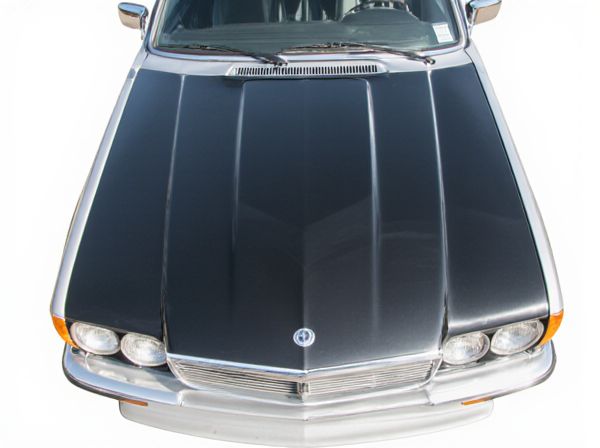
Photo illustration: Custom Hood vs Stock Hood
Choosing a custom hood allows you to enhance your vehicle's style and performance by tailoring materials, design, and features to your specific needs. Stock hoods offer reliability and fitment guaranteed by the manufacturer, making them a convenient and often cost-effective option. Your decision depends on whether you prioritize unique aesthetics and functionality or prefer proven durability and ease of installation.
Table of Comparison
| Feature | Custom Hood | Stock Hood |
|---|---|---|
| Material | Carbon fiber, fiberglass, aluminum | Steel or aluminum |
| Weight | Lightweight, improves performance | Heavier, standard weight |
| Design Options | Highly customizable, vents, scoops | Factory design, limited options |
| Cost | Higher price, depending on material and design | Affordable, OEM pricing |
| Installation | May require modification or professional help | Direct fit, easy installation |
| Durability | Varies by material, some less durable | High durability, factory tested |
| Performance Impact | Improves airflow and reduces weight | Standard performance |
| Warranty | Often limited or no warranty | Comes with manufacturer warranty |
Introduction to Custom vs Stock Hoods
Custom hoods offer personalized design options, enhanced aerodynamics, and materials such as carbon fiber or fiberglass for lightweight performance, unlike stock hoods that come standard from manufacturers with limited style and functionality. Stock hoods prioritize durability and cost-efficiency, ensuring factory fit and finish that maintain the vehicle's original warranty and structural integrity. Choosing between custom and stock hoods depends on balancing customization goals, budget, and intended vehicle use.
Defining Stock Hoods: Features and Functions
Stock hoods are factory-installed automotive components designed to meet original equipment manufacturer (OEM) specifications, ensuring optimal fit, safety, and performance. These hoods typically feature standardized materials like steel or aluminum, engineered for durability, aerodynamic efficiency, and heat management. Functionally, stock hoods serve to protect engine components from environmental elements while maintaining structural integrity and contributing to vehicle aesthetics.
What Makes a Hood “Custom”?
A custom hood is defined by its unique design, material choices, and functional modifications tailored to specific vehicle performance or aesthetic needs, unlike a stock hood which is mass-produced for generic fit and appearance. Custom hoods often incorporate specialized vents, scoops, or lightweight composites like carbon fiber to enhance engine cooling and reduce weight. These features are crafted through personalized fabrication processes, setting them apart from standardized stock hoods.
Aesthetic Differences: Custom vs Stock
Custom hoods offer unique shapes, vents, and designs that enhance vehicle aesthetics by providing a personalized, aggressive look compared to the uniform appearance of stock hoods. Stock hoods prioritize factory specifications and OEM styling for consistency and mass appeal, often lacking distinct visual features. The choice between custom and stock hoods significantly impacts the car's exterior appeal, with custom options enabling standout individuality and tailored styling.
Performance Impact: Functionality Compared
Custom hoods enhance vehicle performance by offering improved aerodynamics and weight reduction compared to stock hoods, often made from lighter materials like carbon fiber or fiberglass. They typically feature functional vents or scoops that optimize engine cooling and airflow, boosting overall engine efficiency. Stock hoods prioritize durability and cost, lacking the specialized design elements that contribute to enhanced performance found in custom alternatives.
Material Choices and Durability Analysis
Custom hoods often use lightweight materials like carbon fiber or fiberglass, providing enhanced durability and weight reduction compared to stock hoods typically made from steel or aluminum. Carbon fiber custom hoods offer superior strength-to-weight ratios, improving vehicle performance and resistance to corrosion. Stock steel hoods are durable but prone to rust, while aluminum hoods resist corrosion better but may dent more easily under impact.
Cost Comparison: Budgeting for Upgrades
Custom hoods typically range from $300 to $2,000 or more depending on materials such as carbon fiber or fiberglass, offering enhanced aesthetics and performance features compared to stock hoods costing between $150 and $600. Installation costs for custom hoods often add $100 to $400, reflecting the need for professional fitting, while stock hoods generally require minimal installation expenses. Budgeting for upgrades involves accounting for both the initial purchase price and potential additional costs for customization or modifications to fit specific vehicle models.
Installation and Fitment Considerations
Custom hoods require precise measurements and often professional installation to ensure proper alignment and secure fit, as they may differ from standard vehicle dimensions. Stock hoods are designed for exact compatibility with specific car models, allowing for straightforward installation and guaranteed fitment without modification. Choosing between custom and stock hoods depends on balancing the need for unique aesthetics or materials with the ease and accuracy of installation.
Resale Value and Warranty Implications
Custom hoods often enhance a vehicle's appearance and performance but may negatively impact resale value if they deviate significantly from factory specifications, causing potential buyers to hesitate. Stock hoods retain the original manufacturer's warranty coverage, while custom hoods can void or limit warranty claims related to engine bay components or structural integrity. Buyers should consider that dealerships typically honor warranties only for original parts, making stock hoods a safer choice for preserving warranty benefits and resale stability.
Choosing the Right Hood for Your Vehicle
Choosing the right hood for your vehicle depends on factors like material, weight, and style preference. Custom hoods often offer enhanced airflow and unique designs to improve performance and aesthetics, while stock hoods provide reliable fitment and OEM durability. Consider your vehicle's intended use, budget, and desired modifications to select the best option that balances functionality and appearance.
 caratoz.com
caratoz.com